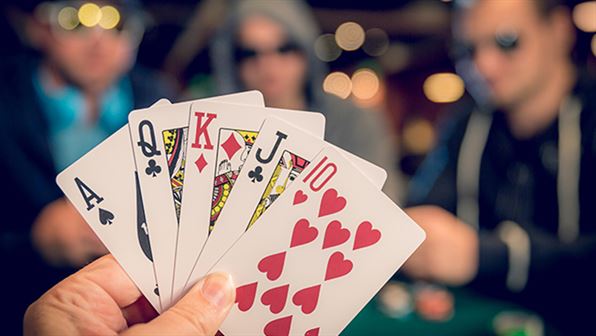Gambling is a popular form of entertainment that has been around for centuries. While many people enjoy gambling as a harmless pastime, it can have a significant impact on mental health. The effects of gambling on mental health can range from mild to severe, and can include anxiety, depression, and even suicide. In this article, we will explore the impact of gambling on mental health and discuss ways to prevent and treat gambling addiction.
The Link Between Gambling and Depression
Gambling has been a popular pastime for centuries, with people from all walks of life enjoying the thrill of placing a bet and potentially winning big. However, while gambling can be a fun and exciting activity, it can also have a negative impact on mental health. In particular, there is a strong link between gambling and depression.
Depression is a serious mental health condition that affects millions of people worldwide. It is characterized by feelings of sadness, hopelessness, and a lack of interest in activities that were once enjoyable. While there are many different factors that can contribute to depression, gambling is one that is often overlooked.
Research has shown that people who gamble are more likely to experience depression than those who do not. This is because gambling can be a very stressful and anxiety-inducing activity. When someone places a bet, they are essentially putting their money on the line and hoping for the best. This can create a lot of pressure and uncertainty, which can be overwhelming for some people.
In addition to the stress and anxiety that gambling can cause, there are also other factors that can contribute to depression. For example, people who gamble may experience financial difficulties if they lose money. This can lead to feelings of guilt, shame, and hopelessness, which are all common symptoms of depression.
Another factor that can contribute to depression in gamblers is social isolation. Many people who gamble do so alone, either online or in a casino. This can lead to feelings of loneliness and isolation, which can be very damaging to mental health. Without a support system in place, it can be difficult for people to cope with the negative emotions that come with gambling.
It is also worth noting that gambling addiction is a real and serious condition that can have a devastating impact on mental health. People who are addicted to gambling may experience intense cravings and urges to gamble, even when it is causing them harm. This can lead to a cycle of depression, anxiety, and addiction that can be very difficult to break.
Despite the negative impact that gambling can have on mental health, many people continue to engage in this activity. This is partly because gambling is often seen as a harmless form of entertainment, and partly because it can be very addictive. However, it is important for people to be aware of the risks associated with gambling, and to seek help if they are struggling with depression or addiction.
There are many different resources available for people who are struggling with gambling-related mental health issues. These include support groups, counseling services, and addiction treatment programs. By seeking help and support, people can learn to manage their symptoms and regain control over their lives.
In conclusion, gambling can have a significant impact on mental health, particularly when it comes to depression. While it may be tempting to view gambling as a harmless form of entertainment, it is important to be aware of the risks and to seek help if necessary. With the right support and resources, people can overcome their gambling-related mental health issues and lead happy, healthy lives.
Anxiety and Gambling: Understanding the Connection
Gambling has been a popular pastime for centuries, with people from all walks of life participating in various forms of gambling. While gambling can be a fun and exciting activity, it can also have a negative impact on mental health. In this article, we will explore the connection between anxiety and gambling and how it can affect individuals.
Anxiety is a common mental health disorder that affects millions of people worldwide. It is characterized by feelings of fear, worry, and unease, which can be triggered by various situations or events. For some individuals, gambling can be a source of anxiety, as they may feel stressed or worried about losing money or not being able to control their gambling habits.
One of the main reasons why gambling can trigger anxiety is the uncertainty of the outcome. Unlike other activities where the outcome is more predictable, such as playing a game of chess or solving a puzzle, gambling involves a significant element of chance. This uncertainty can lead to feelings of anxiety, as individuals may worry about the possibility of losing money or not winning.
Another factor that can contribute to anxiety in gambling is the social pressure that comes with it. Many people gamble in social settings, such as casinos or with friends, which can create a sense of pressure to participate and win. This pressure can be particularly challenging for individuals who struggle with anxiety, as they may feel overwhelmed or uncomfortable in these situations.
Furthermore, the accessibility of gambling can also contribute to anxiety. With the rise of online gambling, individuals can now gamble from the comfort of their own homes, which can make it easier to engage in gambling activities. However, this accessibility can also make it more challenging to control gambling habits, leading to feelings of anxiety and stress.
The impact of anxiety on gambling can be significant, as it can lead to a range of negative consequences. For example, individuals who struggle with anxiety may be more likely to develop a gambling addiction, as they may use gambling as a way to cope with their anxiety. This can lead to financial problems, relationship issues, and other negative outcomes.
Moreover, anxiety can also affect the way individuals approach gambling. For example, individuals with anxiety may be more likely to engage in risky gambling behaviors, such as placing large bets or chasing losses, which can increase the likelihood of negative outcomes.
In conclusion, the connection between anxiety and gambling is complex and multifaceted. While gambling can be a fun and exciting activity, it can also trigger feelings of anxiety and stress, particularly for individuals who struggle with anxiety disorders. Understanding the impact of anxiety on gambling is essential for individuals who want to maintain healthy gambling habits and protect their mental health. By recognizing the potential risks of gambling and taking steps to manage anxiety, individuals can enjoy the benefits of gambling without compromising their mental well-being.
The Impact of Gambling on Relationships and Social Health
Gambling is a popular pastime for many people around the world. It can be a fun and exciting way to spend time with friends and family, and it can even lead to big wins and financial gains. However, gambling can also have a negative impact on mental health, particularly when it comes to relationships and social health.
One of the most significant ways that gambling can impact relationships is through financial strain. When someone becomes addicted to gambling, they may spend more money than they can afford, leading to debt and financial stress. This can put a strain on relationships with partners, family members, and friends, as they may feel the need to bail the gambler out of financial trouble or may become frustrated with the gambler’s inability to manage their finances.
In addition to financial strain, gambling addiction can also lead to social isolation. As the gambler becomes more focused on their addiction, they may withdraw from social activities and relationships, preferring to spend their time and money on gambling instead. This can lead to feelings of loneliness and depression, as well as a lack of support from friends and family members.
Another way that gambling can impact relationships is through the development of co-dependency. Co-dependency occurs when one person becomes overly reliant on another person for emotional or financial support. In the case of gambling addiction, the gambler may become dependent on their partner or family members to bail them out of financial trouble or to provide emotional support when they are feeling down. This can lead to a cycle of enabling behavior, where the partner or family member feels obligated to continue providing support, even if it is detrimental to their own well-being.
Gambling addiction can also lead to a breakdown in communication within relationships. As the gambler becomes more focused on their addiction, they may become less interested in communicating with their partner or family members, leading to misunderstandings and conflicts. This can further strain relationships and lead to feelings of resentment and anger.
Finally, gambling addiction can impact relationships through the development of trust issues. As the gambler becomes more focused on their addiction, they may become less reliable and trustworthy, leading to feelings of betrayal and mistrust from their partner or family members. This can further strain relationships and lead to a breakdown in communication and emotional connection.
In conclusion, gambling addiction can have a significant impact on relationships and social health. It can lead to financial strain, social isolation, co-dependency, breakdowns in communication, and trust issues. If you or someone you know is struggling with gambling addiction, it is important to seek help and support from a mental health professional or addiction specialist. With the right treatment and support, it is possible to overcome gambling addiction and rebuild healthy relationships and social connections.
Gambling Addiction and Its Effects on Mental Health
Gambling addiction is a serious problem that affects millions of people worldwide. It is a condition that can have a significant impact on an individual’s mental health, leading to a range of negative consequences. The effects of gambling addiction on mental health can be devastating, and it is essential to understand the risks associated with this condition.
One of the most significant impacts of gambling addiction on mental health is the development of anxiety and depression. Individuals who struggle with gambling addiction often experience intense feelings of anxiety and stress, which can lead to depression. The constant worry about finances, the fear of losing everything, and the shame and guilt associated with gambling can all contribute to the development of these mental health conditions.
Another significant impact of gambling addiction on mental health is the development of substance abuse disorders. Many individuals who struggle with gambling addiction turn to drugs or alcohol as a way to cope with the stress and anxiety associated with their condition. This can lead to the development of substance abuse disorders, which can have a significant impact on an individual’s mental health and overall well-being.
Gambling addiction can also lead to the development of other mental health conditions, such as obsessive-compulsive disorder (OCD) and attention deficit hyperactivity disorder (ADHD). These conditions can be exacerbated by the constant need to gamble and the inability to control one’s impulses. The constant need to gamble can also lead to the development of other addictive behaviors, such as shopping addiction or sex addiction.
The impact of gambling addiction on mental health can also extend to an individual’s relationships with others. Individuals who struggle with gambling addiction often experience strained relationships with family members, friends, and romantic partners. The constant need to gamble can lead to lying, deceit, and other forms of dishonesty, which can erode trust and damage relationships.
In addition to the impact on relationships, gambling addiction can also have a significant impact on an individual’s financial well-being. Individuals who struggle with gambling addiction often experience financial difficulties, which can lead to stress, anxiety, and depression. The constant need to gamble can also lead to the accumulation of debt, which can have a long-term impact on an individual’s financial stability.
Overall, the impact of gambling addiction on mental health is significant and can have a range of negative consequences. It is essential to seek help if you or someone you know is struggling with gambling addiction. There are many resources available, including support groups, counseling, and treatment programs, that can help individuals overcome their addiction and improve their mental health.
In conclusion, gambling addiction is a serious condition that can have a significant impact on an individual’s mental health. The development of anxiety, depression, substance abuse disorders, and other mental health conditions can all be attributed to gambling addiction. It is essential to seek help if you or someone you know is struggling with this condition, as there are many resources available to help individuals overcome their addiction and improve their mental health.
The Role of Trauma in Gambling and Mental Health
Gambling is a popular pastime for many people around the world. It can be a fun and exciting way to spend time with friends or to try and win some extra cash. However, gambling can also have a negative impact on mental health. In this article, we will explore the role of trauma in gambling and mental health.
Trauma is a significant factor in the development of mental health issues. Trauma can be defined as any event or experience that causes emotional distress or physical harm. Trauma can be caused by a variety of factors, including abuse, neglect, violence, accidents, and natural disasters. Trauma can have a lasting impact on a person’s mental health, leading to conditions such as anxiety, depression, and post-traumatic stress disorder (PTSD).
Gambling can also be a traumatic experience for some individuals. For example, a person may experience significant financial losses while gambling, leading to feelings of shame, guilt, and despair. This can be especially true for individuals who struggle with addiction. Gambling addiction is a serious condition that can lead to financial ruin, relationship problems, and other negative consequences.
In addition to financial losses, gambling can also lead to other traumatic experiences. For example, a person may become involved in illegal activities such as theft or fraud in order to fund their gambling habit. This can lead to legal problems and further trauma.
Furthermore, gambling can also be a trigger for individuals who have experienced trauma in the past. For example, a person who has experienced sexual abuse may find that the sights and sounds of a casino trigger memories of their trauma. This can lead to feelings of anxiety, panic, and other negative emotions.
It is important to note that not everyone who gambles will experience trauma or develop mental health issues. However, for those who do, it is important to seek help. There are many resources available for individuals who are struggling with gambling addiction or other mental health issues.
One resource that may be helpful is therapy. Therapy can help individuals to process their trauma and develop coping strategies to manage their emotions. Cognitive-behavioral therapy (CBT) is a type of therapy that has been shown to be effective in treating gambling addiction and other mental health issues.
In addition to therapy, support groups can also be helpful for individuals who are struggling with gambling addiction or other mental health issues. Support groups provide a safe and supportive environment where individuals can share their experiences and receive support from others who are going through similar struggles.
Finally, it is important to remember that recovery is a process. It may take time and effort to overcome gambling addiction or other mental health issues. However, with the right support and resources, it is possible to achieve a healthy and fulfilling life.
In conclusion, trauma can play a significant role in the development of mental health issues related to gambling. It is important for individuals who are struggling with gambling addiction or other mental health issues to seek help. Therapy, support groups, and other resources can be helpful in managing the impact of trauma on mental health. Recovery is possible, and with the right support, individuals can achieve a healthy and fulfilling life.
Coping with the Emotional Toll of Problem Gambling
Problem gambling is a term used to describe a situation where an individual is unable to control their gambling behavior. This can lead to a range of negative consequences, including financial problems, relationship issues, and mental health problems.
One of the most significant impacts of problem gambling is on an individual’s mental health. People who struggle with problem gambling are at a higher risk of developing mental health problems such as anxiety, depression, and substance abuse.
Anxiety is a common mental health problem that can be caused by problem gambling. People who struggle with problem gambling often experience feelings of worry and fear about their financial situation. They may also feel anxious about their ability to control their gambling behavior, which can lead to feelings of helplessness and hopelessness.
Depression is another common mental health problem that can be caused by problem gambling. People who struggle with problem gambling often experience feelings of sadness, hopelessness, and despair. They may also feel a sense of guilt or shame about their gambling behavior, which can further exacerbate their depression.
Substance abuse is also a common problem among people who struggle with problem gambling. Many people turn to drugs or alcohol as a way to cope with the emotional toll of their gambling addiction. This can lead to a range of negative consequences, including addiction, health problems, and relationship issues.
Coping with the emotional toll of problem gambling can be challenging, but there are several strategies that can be helpful. One of the most important things that people can do is to seek professional help. There are many mental health professionals who specialize in helping people who struggle with problem gambling. They can provide support, guidance, and treatment to help individuals overcome their addiction and improve their mental health.
Another important strategy for coping with the emotional toll of problem gambling is to develop healthy coping mechanisms. This can include things like exercise, meditation, and spending time with friends and family. These activities can help individuals manage their stress and anxiety, and improve their overall mental health.
It is also important for people who struggle with problem gambling to be honest with themselves and others about their addiction. This can be difficult, but it is an important step in the recovery process. By acknowledging their addiction and seeking help, individuals can take control of their lives and improve their mental health.
In conclusion, problem gambling can have a significant impact on an individual’s mental health. People who struggle with problem gambling are at a higher risk of developing mental health problems such as anxiety, depression, and substance abuse. Coping with the emotional toll of problem gambling can be challenging, but there are several strategies that can be helpful. Seeking professional help, developing healthy coping mechanisms, and being honest about their addiction are all important steps in the recovery process. With the right support and guidance, individuals can overcome their addiction and improve their mental health.
Gambling can have a negative impact on mental health. It can lead to addiction, anxiety, depression, and other mental health issues. It is important for individuals to be aware of the potential risks and seek help if they are struggling with gambling addiction. Additionally, society should work towards reducing the stigma surrounding mental health and providing resources for those in need.




